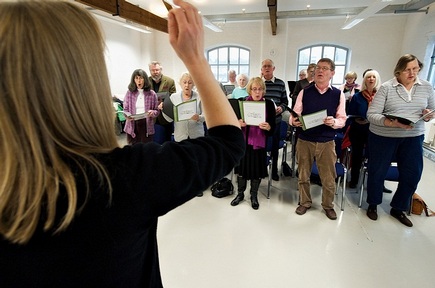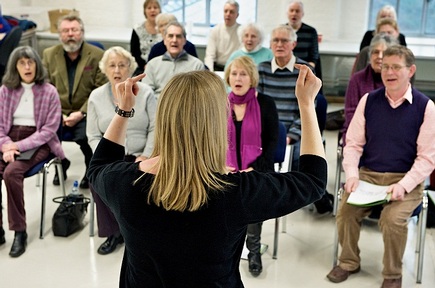Community singing can improve the health of older people, research finds
Singing has always been able to lift one’s spirits, but new research has shown it can also improve the health of older people, especially when they are involved in community singing programmes. The findings revealed that singing groups for older people are as cost-effective as a health promotion strategy.

The world’s first randomised controlled trial into the health benefits of community singing was conducted by the Sidney De Haan Research Centre for Arts and Health at Canterbury Christ Church University. The Centre is internationally recognised for its commitment to researching the potential value of music, and other participative arts activities, in the promotion of wellbeing and health of individuals and communities.
The two year research project assessed the impact singing groups have on older people’s physical and mental health, along with effectiveness and cost-effectiveness.

In two sample groups of 240 volunteers over 60-years-old, one group took part in weekly singing sessions over three months and the other didn't. The research revealed an increase in the mental health component score on a validated health measure amongst the group of singers. It also revealed significantly reduced anxiety and depression scores on a separate widely used NHS measure amongst the singing group.
The results also pointed towards an improvement in quality of life scores, on a measure used to assess the cost-effectiveness of health interventions, and recognised by the National Institute of Clinical Excellence (NICE).
Professor Stephen Clift, director of research at the Sidney De Haan Research Centre for Arts and Health, said: "Our research has not only cemented previous studies that pointed to an increase in health benefits from community singing programmes, but also demonstrated that singing programmes are a cost-effective method of health promotion against NHS measures for this group of people.
"The design of the study has enabled us to put a value on the results which could ultimately result in substantial cost savings for the NHS and local authority adult services."
Dr John Rodriguez, assistant director of public health, NHS Kent and Medway, said: "I'm delighted to see such world-class research in this field helping to provide evidence that singing programmes present a viable additional means to promoting the mental health of older people."

Funded by a £250,000 award from the National Institute for Health Research's "Research for Patient Benefit" programme, The Centre worked closely with third sector organisation Sing For Your Life to facilitate the singing groups.
The Centre continues its research on singing for the wellbeing and health of older people, Chronic Obstructive Pulmonary Disease patients and people with enduring health problems.
Images: Reproduced by kind permission of the British Lung Foundation www.lunguk.org
Latest News
 29-Jul-24
Dementia Bus gives carehome.co.uk staff insight into life with dementia
29-Jul-24
Dementia Bus gives carehome.co.uk staff insight into life with dementia
 01-Mar-24
Find out the top care homes in 2024
01-Mar-24
Find out the top care homes in 2024
 21-Mar-23
UK's top care homes in 2023 revealed
21-Mar-23
UK's top care homes in 2023 revealed
 03-Jan-23
carehome.co.uk launches free care helpline
03-Jan-23
carehome.co.uk launches free care helpline
 13-Dec-22
5 mins with Emily Whitehurst, chief operating officer for Constantia Healthcare
13-Dec-22
5 mins with Emily Whitehurst, chief operating officer for Constantia Healthcare